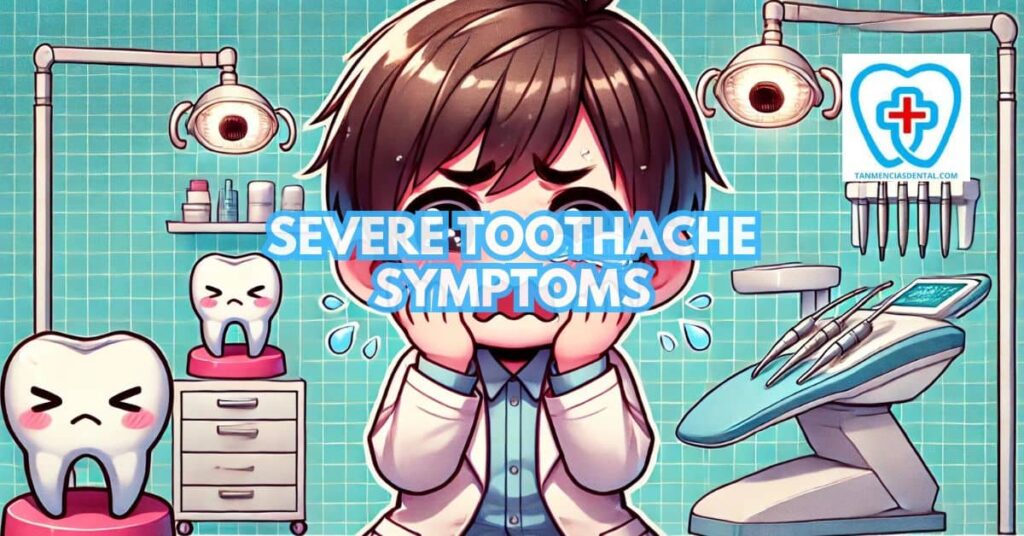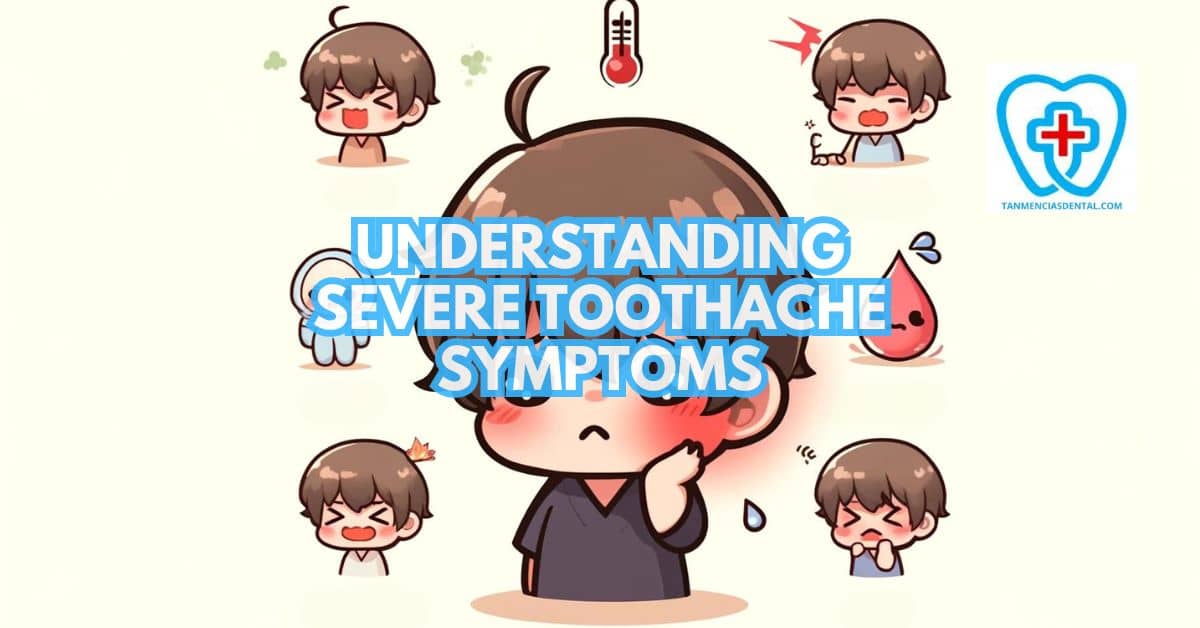Severe toothache symptoms can make simple activities like eating and talking very painful.
The constant pain may also cause difficulty sleeping and affect your overall health.
These symptoms often indicate serious dental problems that need quick attention.
By understanding severe toothache symptoms, you can seek the right care early and prevent more damage.
Ignoring these signs can lead to bigger dental issues and higher treatment costs in the future.
1. Common Causes of Toothaches: Identifying the Culprits
Toothaches can arise from various dental conditions, and understanding these causes can help in seeking timely dental treatment.
One of the most common causes is dental decay, which occurs when bacteria in plaque produce acids that erode tooth enamel, leading to cavities and pain.
Untreated cavities can progress to infect the tooth’s pulp, causing inflammation and severe discomfort.
Gum disease, often marked by red, swollen, and bleeding gums, can also result in toothaches, as it damages the soft tissue and bone supporting the teeth, potentially leading to tooth loss.
Another significant cause is abscesses, which are painful infections that develop at the tooth’s root or between the gum and tooth, often requiring antibiotics to prevent complications.
Dental trauma from accidents or sports injuries can crack or fracture teeth, exposing sensitive inner layers and triggering pain.
Recognizing these symptoms and their underlying causes early can prevent the need for more invasive procedures and reduce the risk of long-term oral health issues.
🦷 What to Expect Before and After Teeth Cleaning – And How to Get Ready
2. Symptoms of a Toothache: More Than Just Pain
The symptoms of a toothache extend beyond pain; they can include persistent, severe discomfort that may be throbbing or stabbing in nature.
Sensitivity to temperature changes or pressure during biting is another clear sign of a dental problem.
Bad breath or a foul taste in the mouth can also accompany a toothache, indicating a possible infection.
Some individuals may experience swelling in the cheek or jaw area, a symptom that should not be ignored.
If these symptoms are present, it’s crucial to consult a dentist, as they can signify a serious condition needing prompt treatment.
🦷 Can You Whiten Teeth with Crowns? Let’s Talk About Your Options for a Brighter Smile
3. When to See a Dentist: Don’t Wait Until It’s Too Late
Seeing a dentist at the first sign of toothache can prevent minor issues from becoming major ones.
Pain that persists for more than a day or two, especially if accompanied by signs of infection like fever, swelling, or pus, warrants immediate dental attention.
Regular checkups can catch potential problems early, but sudden or severe pain should be addressed as soon as possible.
For those hesitant to seek care, remember that dental technology and pain management have advanced significantly, making visits more comfortable than ever.
Additionally, using pain medication can help manage discomfort until you see your dentist.
Practicing good oral hygiene, such as brushing and flossing regularly, is crucial for preventing toothaches and maintaining overall dental health.
Ignoring the problem can lead to damage in deeper parts of the tooth, requiring more extensive treatments later on.
🦷 TMJ Disorder Therapy in Marikina: Say Goodbye to Those Headaches
4. The Connection Between Toothache and Overall Health
Severe toothaches can sometimes be linked to other health problems like diabetes and heart disease.
For instance, people with diabetes are more prone to gum disease, which can cause significant tooth pain.
Heart disease may be connected to poor oral health because infections in the mouth can spread to the heart.
Autoimmune disorders, where the body’s immune system attacks healthy cells, can also affect the gums and teeth, leading to discomfort and pain.
Understanding these connections highlights how taking care of your teeth is important for maintaining your overall health.
🦷 What Happens If You Don’t Brush Your Teeth with Braces? Here’s What You Should Know

5. The Role of Wisdom Teeth in Toothache Pain
Wisdom teeth, or third molars, often emerge during late adolescence or early adulthood and can be a common source of dental pain.
These teeth may become impacted, meaning they cannot fully erupt through the gum line, leading to pain, swelling, and sometimes infection.
Even when they do emerge correctly, wisdom teeth can crowd other teeth, causing alignment issues and discomfort.
Regular dental checkups allow dentists to monitor the progress of wisdom teeth and recommend removal if they pose a potential problem.
Early intervention can prevent the pain associated with wisdom teeth and avoid complications with nearby teeth.
🦷 Dental Hygiene Tips for the New Year – Let’s Start Fresh
6. How Brushing Your Teeth Can Prevent Toothache
Brushing your teeth twice a day with fluoride toothpaste is fundamental to preventing toothaches.
This simple practice helps to remove plaque, a sticky film of bacteria that contributes to tooth decay and gum disease.
Fluoride strengthens the enamel, making it more resistant to acid attacks from plaque, bacteria, and sugars in the mouth.
Effective brushing techniques, including brushing for at least two minutes and using a toothbrush with soft bristles, can prevent the buildup of conditions that lead to toothaches.
In addition, replacing your toothbrush every three to four months is crucial for maintaining oral health and preventing toothaches.
🦷 How to Stop Chipped Teeth and Tartar from Messing with Your Smile
7. Toothache Treatment: The Dental Care You Need
Treatment for toothache varies depending on the underlying cause but may include fillings, root canal therapy, or tooth extraction.
Fillings are used to repair cavities and restore tooth structure, effectively relieving pain caused by decay.
Root canal therapy involves removing the infected or damaged pulp inside a tooth, addressing the source of pain from deep within.
In cases where a tooth is severely damaged or decayed, extraction might be the best option to alleviate pain and prevent further issues.
Regular dental visits allow for the early detection and treatment of problems, minimizing the need for more extensive procedures.
🦷 New Year, New Dental Resolutions – Time to Get That Healthy Smile
8. Pain Relief Strategies for Severe Toothache
While waiting for a dental appointment, several strategies can help manage the pain of a severe toothache.
Over-the-counter pain relievers, such as ibuprofen or acetaminophen, can temporarily alleviate discomfort.
Applying a cold compress to the face near the affected area can reduce swelling and numbness.
It’s also advisable to avoid foods and drinks that are extremely hot, cold, or sweet, as they can exacerbate toothache pain.
Rinsing the mouth with warm salt water can help reduce swelling and clean away irritants.
However, these measures are temporary, and seeing a dentist for a definitive diagnosis and treatment is essential.
🦷 How Braces Are Removed – Is It Painful? Here’s Everything You Need to Know
9. How Grinding Your Teeth Affects Toothache
Teeth grinding, or bruxism, often occurs during sleep, leading to toothaches, jaw pain, and even damage to the teeth over time.
This habit can wear down tooth enamel, increase tooth sensitivity, and result in chipped or broken teeth, all of which contribute to toothache.
Bruxism can also exacerbate symptoms of TMJ disorders, causing further discomfort.
Dentists can provide custom-fitted mouthguards to protect the teeth from the effects of grinding at night.
Recognizing and addressing the stress or sleep issues that often contribute to bruxism is also important for preventing toothache.
🦷 Do Electric Toothbrushes Make Your Teeth Whiter? Here’s What You Should Know
10. Toothache Prevention: Habits to Keep Your Teeth Healthy
Maintaining good oral hygiene is fundamental to warding off toothaches and serving as the foundation for a healthy mouth and a vibrant smile.
Regular brushing with fluoride toothpaste plays a crucial role in protecting the enamel and preventing decay, which directly causes toothache by affecting the nerves and blood vessels within teeth.
Daily flossing is essential to remove plaque and food particles from between teeth, where brushes can’t reach, thus reducing the risk of cavities and gum disease.
Incorporating regular dental checkups allows for professional cleaning and examination, identifying and addressing potential issues before they escalate into painful problems.
Limiting the consumption of sugary snacks and acidic drinks is a key preventive strategy, as these are the primary culprits that cause toothache by eroding tooth enamel.
Moreover, quitting smoking can dramatically lower the risk of gum disease, another common cause of toothache, by improving the overall health of the mouth’s soft tissues.
Adopting these habits not only serves as an effective remedy to prevent toothaches but also bolsters overall oral health, ensuring a lifetime of healthy smiles.
🦷 How Often Should You Brush Your Teeth with Braces? Let’s Clear That Up
11. Severe Toothache Symptoms: Recognizing When Immediate Action Is Needed
Severe toothache symptoms, encompassing intense, throbbing pain, significant swelling, or fever, are clear indicators that immediate dental attention is required.
Such discomfort often points to an infected tooth, where the pain may come and go but gradually intensifies over time, signaling deeper underlying issues.
These symptoms may be indicative of an abscess or serious infection that, without prompt treatment, has the potential to spread beyond the mouth to other parts of the body, posing a significant health risk.
Pain experienced upon biting or chewing should never be overlooked, as it can be a direct sign of decay or a fracture reaching the tooth’s inner layers.
Furthermore, visual changes such as bumps on the gums or the darkening of a tooth serve as critical alerts that necessitate a swift evaluation by a dental professional.
An x-ray may be required to accurately diagnose the extent of the infection and to formulate an effective treatment plan.
By recognizing these severe symptoms early and seeking immediate care, it’s possible to avert more serious health complications and ensure the preservation of your dental health.
🦷 Why Are Braces So Expensive? A Look at the Hidden Costs of Orthodontics
12. How Do I Know My Toothache Is Serious?
To know if your toothache is serious, pay attention to the pain’s intensity and duration.
If the pain is severe, lasts more than a day or two, or gets worse over time, it might be serious.
Look for other symptoms like swelling, fever, or a bad taste in your mouth, which can indicate an infection.
Sensitivity to hot or cold temperatures and difficulty chewing might also signal a serious issue.
It’s best to visit a dentist promptly for a professional evaluation and proper treatment.
🦷 Comprehensive Dental Care in Marikina
👨⚕️ Conclusion
Understanding and managing severe toothache symptoms are crucial steps in maintaining oral health and overall well-being.
Proactive measures, including regular dental checkups, proper oral hygiene practices, and timely treatment, can prevent the occurrence of severe toothaches.
Educating oneself about the signs of dental problems and the importance of early intervention empowers individuals to take control of their dental health.
Remember, preventing toothache not only saves you from pain but also preserves the health and longevity of your teeth.
Let this comprehensive guide serve as a resource for managing and preventing toothache, ensuring a healthy, pain-free smile.
😊 Self-Promotion
At Tan-Mencias Dental Clinic, located in the heart of Parang, Marikina City, we understand the impact of severe toothache symptoms on your daily life.
Our expert team is dedicated to providing prompt, effective treatments for all your dental concerns, from wisdom tooth extraction to preventive care that keeps toothaches at bay.
With flexible communication options, you can easily reach out to us for any questions or to schedule an appointment—simply call us at 9171451074, send a message through our Facebook page, or use the contact form on our website.
We’re committed to ensuring your visit is comfortable, stress-free, and leaves you with a healthy, radiant smile.
Let Tan-Mencias Dental Clinic be your partner in achieving and maintaining optimal oral health in a friendly and welcoming environment.

